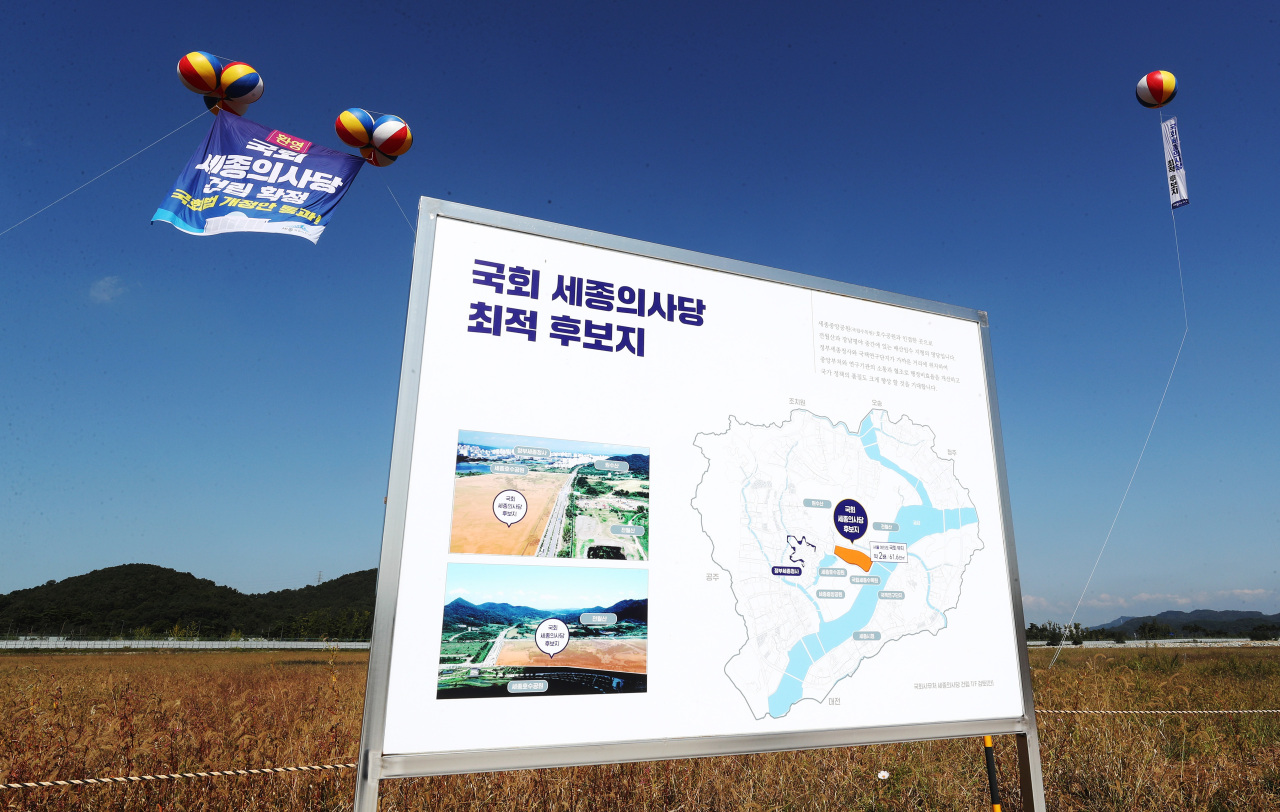Capital relocation plan gains steam with National Assembly opening a branch in Sejong
By Ko Jun-taePublished : Oct. 3, 2021 - 13:20

After the National Assembly passed a bill last week to open a regional branch of the legislature in Sejong, eyes are watching to see how the plan will unfold and whether the long-debated capital relocation plan will finally get a boost.
Lawmakers on Tuesday passed a revision to the National Assembly Act approving the establishment of a regional branch of the parliament in Sejong, the special self-governing city that serves as a second administrative capital for South Korea.
Its passage comes nearly five years after the first related bill was proposed. Former President Roh Moo-hyun vowed to relocate the capital from Seoul to Sejong 20 years ago.
It is expected that the new parliamentary branch will open its doors in 2027 if all steps are taken without delay. The plan is believed to require a total of 1.43 trillion won ($1.21 billion) to put into action.
The plan at the moment includes moving 11 parliamentary committees from Yeouido, western Seoul, to Sejong. The city expects the National Assembly Secretariat and National Assembly Library to relocate as well.
As decentralization has been a key issue in Korea, relocating at least a portion of the National Assembly represents a step forward for the ruling Democratic Party of Korea, which has long favored the relocation of the capital.
Its relocation has also earned the support of opposition parties, as the concentration of infrastructure and resources in Seoul has led to unequal development.
In Korea, around half of the country’s 51.8 million people live in Seoul and the surrounding metropolitan area. Population increases and skyrocketing housing prices have led the ruling bloc to revive its old plan of making Sejong the official administrative capital of Korea.
Central government ministries and agencies have moved from Seoul to Sejong in phases, but the project has been left half-finished as the Constitutional Court earlier ruled that Seoul being the capital of the country is in the “customary Constitution.”
Ministry officials complain that they have to spend half the day traveling back and forth to Seoul, where many of the most important meetings take place.
Officials have already said they will continue to look for ways to move more functions to Sejong as a means of decentralization. Lawmakers are also discussing moving the entire National Assembly to Sejong.
“We have to contemplate moving the entire National Assembly instead of merely establishing a regional branch in Sejong,” said Rep. Kim Gi-hyeon, floor leader of the main opposition People Power Party, in a meeting Thursday.
“Parties, members of society and the people have to form a consensus and engage in fundamental levels of discussion. I hope a resolution is found not too late.”
Lawmakers on Tuesday passed a revision to the National Assembly Act approving the establishment of a regional branch of the parliament in Sejong, the special self-governing city that serves as a second administrative capital for South Korea.
Its passage comes nearly five years after the first related bill was proposed. Former President Roh Moo-hyun vowed to relocate the capital from Seoul to Sejong 20 years ago.
It is expected that the new parliamentary branch will open its doors in 2027 if all steps are taken without delay. The plan is believed to require a total of 1.43 trillion won ($1.21 billion) to put into action.
The plan at the moment includes moving 11 parliamentary committees from Yeouido, western Seoul, to Sejong. The city expects the National Assembly Secretariat and National Assembly Library to relocate as well.
As decentralization has been a key issue in Korea, relocating at least a portion of the National Assembly represents a step forward for the ruling Democratic Party of Korea, which has long favored the relocation of the capital.
Its relocation has also earned the support of opposition parties, as the concentration of infrastructure and resources in Seoul has led to unequal development.
In Korea, around half of the country’s 51.8 million people live in Seoul and the surrounding metropolitan area. Population increases and skyrocketing housing prices have led the ruling bloc to revive its old plan of making Sejong the official administrative capital of Korea.
Central government ministries and agencies have moved from Seoul to Sejong in phases, but the project has been left half-finished as the Constitutional Court earlier ruled that Seoul being the capital of the country is in the “customary Constitution.”
Ministry officials complain that they have to spend half the day traveling back and forth to Seoul, where many of the most important meetings take place.
Officials have already said they will continue to look for ways to move more functions to Sejong as a means of decentralization. Lawmakers are also discussing moving the entire National Assembly to Sejong.
“We have to contemplate moving the entire National Assembly instead of merely establishing a regional branch in Sejong,” said Rep. Kim Gi-hyeon, floor leader of the main opposition People Power Party, in a meeting Thursday.
“Parties, members of society and the people have to form a consensus and engage in fundamental levels of discussion. I hope a resolution is found not too late.”

















![[KH Explains] Hyundai's full hybrid edge to pay off amid slow transition to pure EVs](http://res.heraldm.com/phpwas/restmb_idxmake.php?idx=652&simg=/content/image/2024/04/18/20240418050645_0.jpg&u=20240418181020)

![[Today’s K-pop] Zico drops snippet of collaboration with Jennie](http://res.heraldm.com/phpwas/restmb_idxmake.php?idx=642&simg=/content/image/2024/04/18/20240418050702_0.jpg&u=)